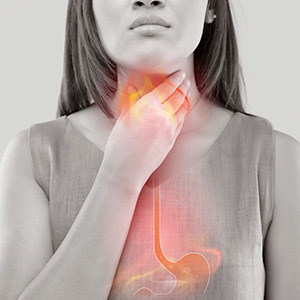
If you're looking for ways to take control of your Gastroesophageal Reflux Disease (GERD) symptoms, building awareness and knowledge is key. GERD can be a troubling condition that can lead to severe discomfort and nausea if left unmanaged. Whether you are newly diagnosed or have been managing symptoms for some time, there are many causes and prevention strategies that you can consider when trying to manage the signs and effects of this digestive disorder. In this blog post, we'll explore what GERD is, its common causes, as well as simple lifestyle changes and treatment approaches to help reduce the likelihood of having flare-ups associated with it.
What is GERD and the Symptoms You Should Watch Out For
GERD, also known as Gastroesophageal Reflux Disease, is a chronic digestive disorder that affects millions of people worldwide. It happens when the stomach acid flows back into the esophagus, causing irritation and inflammation. The most common symptoms of GERD are heartburn and regurgitation, but it can also cause chest pain, difficulty swallowing, and a chronic cough. The causes of GERD vary, but it's often linked to obesity, pregnancy, and certain medications. Fortunately, there are many ways to prevent GERD, including avoiding trigger foods, losing weight, and eating smaller meals. By understanding the symptoms and taking the necessary precautions, anyone can lead a healthy and balanced life free from the discomfort of GERD.
Identifying Potential Causes of GERD
GERD, or gastroesophageal reflux disease, is a relatively common condition that affects millions of people worldwide. It is caused by the backflow of stomach acid into the esophagus, which can lead to a range of uncomfortable symptoms, including heartburn, chest pain, and difficulty swallowing. While the exact causes of GERD are not fully understood, there are several potential factors that may contribute to the development of the condition, including lifestyle choices, medical conditions, and certain medications. Some common preventive measures include eating smaller, more frequent meals throughout the day, avoiding trigger foods, and maintaining a healthy weight. By identifying the potential causes of GERD and taking steps to prevent it, individuals can manage their symptoms and improve their overall quality of life.
Dietary Tips for Managing GERD Symptoms
GERD, or gastroesophageal reflux disease, can be a frustrating condition to manage. For those who suffer from it, the burning pain in your chest and throat can be unbearable. Fortunately, there are some dietary tips that can help alleviate the symptoms of GERD. One of the main causes of GERD is an excess amount of stomach acid, so avoiding acidic foods and drinks can be helpful in preventing symptoms. Foods like tomatoes, chocolate, and caffeine can all trigger GERD symptoms, so it's important to be mindful of what you're consuming. Additionally, eating smaller meals and avoiding heavy, fatty foods can help with digestion and prevent symptoms from occurring. With a few simple changes to your diet, you can greatly reduce the discomfort that comes with GERD.
Natural Remedies and Supplements That May Help
GERD, or gastroesophageal reflux disease, is a chronic digestive disorder that affects millions of people worldwide. The condition occurs when stomach acid flows back into the esophagus, causing uncomfortable symptoms such as heartburn, regurgitation, and chest pain. While medications are typically used to manage GERD, many individuals have turned to natural remedies and supplements for relief. Some of these remedies and supplements include ginger, aloe vera juice, probiotics, and melatonin. However, it is important to note that these natural options should be used in conjunction with a healthy diet and lifestyle changes to prevent GERD symptoms from occurring in the first place.
When to See a Doctor for Your GERD Symptoms
If you're experiencing symptoms of GERD - Gastroesophageal Reflux Disease - it's important to know when it's time to seek medical attention. GERD is a chronic digestive disorder that can cause discomfort and even damage to your esophagus if left untreated. While the causes of GERD vary between individuals, common triggers include fatty or spicy foods, caffeine, and alcohol. To prevent GERD symptoms from becoming unmanageable, it's recommended to avoid these types of foods and drinks. But if you're finding that your symptoms persist or worsen despite dietary changes, it's time to schedule an appointment with your doctor. Don't suffer in silence - early treatment can help save you from more resilient damage in the future.
Strategies to Prevent Future Flare-Ups
GERD (gastroesophageal reflux disease) is a common condition that affects millions of people worldwide. The causes of GERD vary from person to person and can be triggered by certain foods, medications, or lifestyle factors. Although there is no cure for GERD, there are several strategies that can be implemented to prevent future flare-ups. One of the most effective ways to prevent GERD is to avoid foods that are known to trigger symptoms, such as spicy or acidic foods. Additionally, maintaining a healthy weight, eating smaller meals, and not eating before bedtime can also help prevent GERD. By following these prevention strategies, individuals with GERD can reduce their symptoms and improve their quality of life.
